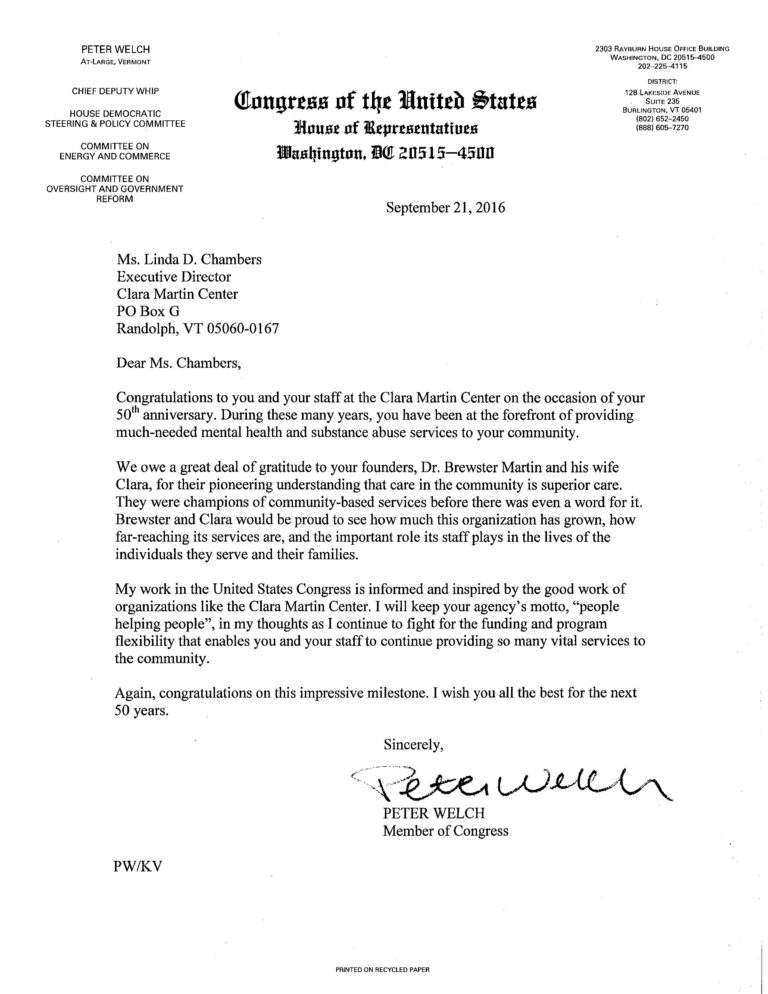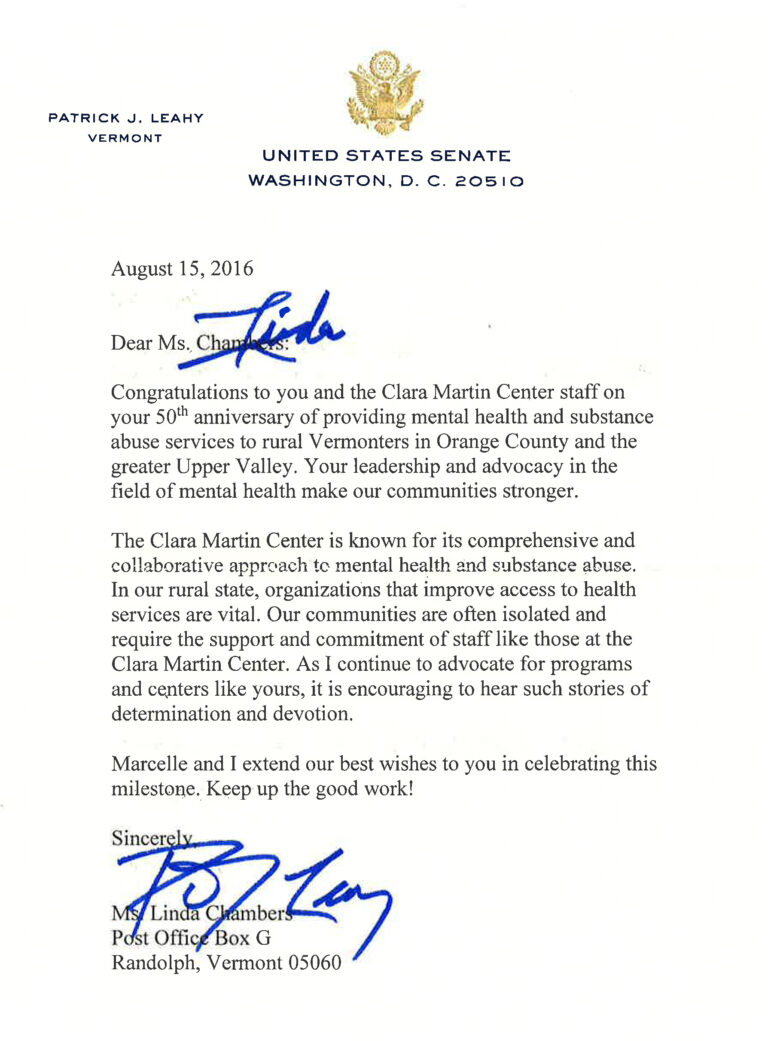Celebrating 50 Years of Helping People
Clara Martin Center kicks off “May is Mental Health Month” with the first in a series of articles about the history of community mental health and the changes that have shaped the agency over the last 50 years.
In 2016, the Clara Martin Center celebrates 50 years of providing high-quality community mental health services in Orange County and the greater Upper Valley. Originally known as Orange County Mental Health Services, the name of the center was changed to the Clara Martin Center in 1994 to honor Clara Martin, one of its founders and a pioneer for mental health care in Orange County.
When John F. Kennedy signed the Community Mental Health Act into law in 1963, it changed the delivery of mental health care across the country. This was the last legislation he signed into law prior to his assassination three weeks later.
The Community Mental Health Centers Act Amendments of 1965 provided grants for constructing and staffing facilities to treat substance use disorders when it became apparent that comprehensive treatment for addiction and mental disorders was essential to treating the whole individual.
Called a “bold new approach,” this new legislation authorized Federal grants for the construction of community mental health centers to provide inpatient, outpatient, partial hospitalization, emergency services, and consultation services. This began a new movement to treat mental illness in community settings, rather than psychiatric hospitals and other institutions, with an effective, humane, and cost-savings approach. In Vermont, a designated agency system of care was created in every county.
At that time, Clara Martin and others were advocating for this rural region as part of the reform effort. This ensured that the small rural towns in Orange County were not overlooked when the state rolled out the new Federal initiative to create a designated community mental health system.
Clara and her husband, Dr. Brewster Martin, had come to Chelsea, Vermont, in 1953 and opened a medical practice and later a nursing home, caring for local residents. Clara worked as Brewster’s assistant and recognized that the care for those with a mental illness – usually a stay at the state hospital lasting for several years and sometime decades – often robbed the spirit from their lives.
Clara Martin and others shared concern for the care of those patients and wanted to bring those affected back home to their communities. At the time, Dr. Martin’s office had a social worker one half-day each week. The local mental illness specialist had a waitlist of six months or more.
With the new legislation, initial and minimal services were offered out of Dr. Martin’s medical office and broadened into the region with the establishment of the Orange County Mental Health Services on October 27, 1966. Located in Randolph, Vermont, the agency served all of Orange County and the five northernmost Windsor County towns, establishing the deep roots that have allowed the agency to grow and strengthen in order to meet the ever-changing needs of these communities over the last 50 years.
The center’s Board of Directors has a long history of dedicated community members working to strengthen the organization. Clara Martin served on the Board of Directors until her death in 1990, when Dr. Brewster Martin took her seat and, until his death in 2007, focused the agency on the philosophy of treating the whole person. Arnold Spahn, current Board President and longtime Randolph resident and business owner, has served on the board for over 40 years, modeling his commitment to community service and the value of helping the whole community. June Phillips, retired board member, longtime community member, and devoted family member, served many years on the Board of Directors and was an advocate for compassionate client care and helping family members.
Agency Development
In the 1970s and 80s, Clara Martin Center expanded to a second site in Bradford offering outpatient services, allowing for more people to be served in their local towns and expanding services available in the broader region.
In 1982, Clara Martin Center began working with the Department of Corrections to establish services focused on offenders returning to the community and outpatient services with a focus on substance use services to those involved with the court or corrections system to support successful re-entry into the community.
In 1986, the Quitting Time program opened in a new Wilder location in partnership with the local Veterans Administration. This intensive outpatient substance use program was a new model of treatment offering an alternative to residential programming and allowed veterans to receive services in close proximity to the medical facility and for others to continue to remain at home and work while receiving treatment.
In the late 80s and early 90s the agency was struggling with financial sustainability issues and the State had initiated the process to deinstitutionalize the Brandon Training School, a public institution for people with developmental disabilities. The agency and local residents decided to create a separate agency to focus on services to consumers with developmental disabilities, and Upper Valley Services was established. Currently directed by Bill Ashe, both agencies continue to work closely to coordinate care and ensure local services are available to those in need.
1994 brought great change to the agency. Along with a name change to reflect the original pioneer of Clara Martin Center, Linda Chambers, a fifth generation Vermonter, was appointed Executive Director. Chambers quickly became a pioneer for the agency in her own right, helping Randolph rebuild after three fires devastated the downtown in 1993. Clara Martin Center moved their offices to the new Winslow Block building in 1995, where the agency is an anchor in the center of town, improving access to services, and helping the local economy with over 50 employees.
In 1996, the agency designated one of the buildings that had become available after the downtown move to become a transitional homeless shelter for individuals suffering from mental illness. Safe Haven opened in 1998 as a collaborative program between Clara Martin Center, Vermont Psychiatric Survivors, and the National Alliance of the Mentally Ill (NAMI). Linda Corey, a leader for the Vermont Psychiatric Survivors, and June Phillips, a local NAMI representative, were active members in the development of Safe Haven’s principles. After Linda Corey’s passing and changes in funding, Clara Martin Center took on sole oversight of the facility in 2014, continuing to provide a place for consumers to live within the community while working on personal goals in a safe and supportive recovery-oriented environment.
In 1997, Central Vermont Substance Use Services (CVSAS) was established in Berlin, Vermont, as a joint partnership of Clara Martin Center and two sister agencies – Washington County Mental Health Services (WCMHS) and Howard Center. This agency provides outpatient and intensive outpatient alcohol and other drug treatment services for the greater Washington County area and is now part of the hub-and-spoke system to assist in addressing the opiate epidemic today.
Clara Martin Center greatly expanded school services during the 2000s. In 2002, the agency opened its own independent, licensed alternative school, East Valley Academy, in East Randolph. Originally known as the Challenger program, the name was changed to reflect the original name of the community where the school is located. Partnerships among multiple schools and supervisory unions have allowed the agency to provide services to children in their natural school settings with a focus on prevention and early intervention.
The Transition Age Youth (TAY) program launched in 2006 in the Randolph region and expanded in 2011 to the Bradford and Wilder regions. The program provides youth (16-22 years-old) with comprehensive therapeutic services and supports in the communities, as well as treatment for overall wellness, substance use, and other needs as part of a person-centered treatment model. As part of the TAY program, Jump On Board for Success (JOBS) prepares young adults for securing and maintaining employment. Adventure Programming in TAY challenges social development skills and explores personal strengths to promote self-discovery and meaningful relationships through hands-on learning in a group format.
Collaborative Solutions Corporation was established in 2007 as another partnership between Clara Martin Center and two sister agencies (WCMHS and Howard Center), committed to creating Community Recovery Residences to meet step-down needs of Vermont State Hospital patients in a less restrictive setting. Second Spring South opened in Williamstown, Vermont, as a residential treatment home and Second Spring North later opened in Westford, Vermont.
Community Focus
Under Chambers’ leadership, the agency continued to meet the broad needs of the community. Staying responsive to the community when its citizens are most in need is one of agencies guiding principles, so when Tropical Storm Irene heavily impacted the agency’s service area, Clara Martin Center was there for the communities affected. With service delivery methods put to the test, the agency found new ways to provide necessary services outside of its normal settings.
At times the effects of the storm left whole communities isolated from other towns and without the ability to access needed services. Clara Martin Center sent staff out to affected communities to help assess needs and provide the beginning framework to address the mental health impacts of this disaster. Staff helped deliver medications to residents, assisted residents in accessing FEMA supports, attended town forums, and acted in concert with the towns to help provide the assistance needed. These efforts continued for months after the storm until residents were able to reestablish a balanced life style and could move forward in recovery.
When the storm forced the closure of the Vermont State Hospital, the Legislature passed Act 79 to develop and help fund an array of community-based services in a renewed effort to keep people from needing to access inpatient care through the few beds that remained available. It also aimed to provide options for more intense community-based services close to home. Clara Martin Center put emphasis on increasing the availability of community outreach staff, case managers, and stabilization services for those not traditionally eligible for such services.
The Chris’s Place diversion bed program was launched in the spring of 2012 as one of these new initiatives, to provide short-term residential care in a setting staffed around the clock for those experiencing an acute episode. Providing access to these support beds averts some pressure on the hospital system. The program was named in honor of Christopher Vezzetti, son of former board member, June Phillips. Chris was an inspiring man and a beloved citizen of the agency for over three decades.
Looking Forward
In efforts to be more timely and responsive to community needs, the agency launched an aggressive plan in an effort to provide same day access. These efforts helped to maximize clinicians’ time and streamlined the experience for a consumer seeking care for the first time or for those already in care and wanting greater ease in scheduling appointments. This initiative has produced remarkable changes in the ability to provide care within days of the initial call to the agency. Emergency care continues to be available the same day requested and walk-in services are available.
Currently, the agency is working with the State and other partners to develop permanent housing in this region. With changes in HUD funding and other housing supports, this service will provide great benefits to the communities Clara Martin Center serves.
With services at multiple sites, schools, and homes throughout this area, Clara Martin has made mental health care more accessible than it has ever been, allowing consumers to receive the care they need while carrying on their lives in their own communities. With health care reform in full swing at the State and Federal levels, advocacy is strong within the agency, just as it was when it was established 50 years ago. Clara Martin Center remains committed to advocacy for this region, ensuring that these rural areas are not overlooked and continue to have access to local services.



